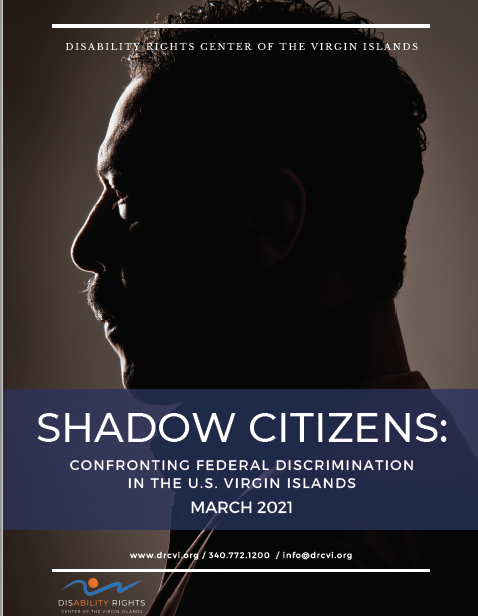
A new report by the Disability Rights Center of the Virgin Islands lays out in damning detail the crippling health care disparities suffered by the U.S. citizens of America’s overseas territories. Decades of disparate treatment under Medicaid, Medicare and Obamacare are major drivers and making recent fixes to Medicaid permanent is especially important, the report concludes.
“This has been an issue that has been smoldering for some time,” and as the COVID-19 pandemic puts the nation’s racial health disparities in stark relief, now is an opportune time to address the inequalities, Amelia Headley LaMont, the center’s executive director, said in an interview on Wednesday.
“The first of April will mark the U.S. Virgin Islands’ 104th year as a United States territory. Despite unceasing outward promises of equality before the law, the United States has allowed alarming disparities to grow even more glaring and blatant over time,” Headley LaMont writes in a forward to the report, “Shadow Citizens: Confronting Federal Discrimination in the U.S. Virgin Islands.”
These include arbitrary and crippling caps on Medicaid funding that historically left the USVI government to foot anywhere from 60 to 100 percent of the bill for the care of its most vulnerable populations and the territory’s total exclusion from Supplemental Security Income, the largest federal cash assistance program in the U.S. that provides monthly support to disabled, blind or elderly individuals who have minimal or no income or assets.
While states get Medicaid funding based on population demographics and a sliding scale for federal reimbursement, the USVI historically got a much smaller amount of funding in a lump sum. In the past, by federal law, the V.I. had to pay 45 percent matching costs and Medicaid funds 55 percent while some states have a 25-75 percent split. This meant far fewer V.I. residents could qualify for Medicaid and providing it cost the local government millions more than a similar stateside jurisdiction.
Instead, the territory was, and to an extent still is, relegated to relying on a patchwork of “adult assistance programs” funded by various block grants that provide a tiny fraction of what states receive through SSI, and also are subject to federal caps, according to the 64-page report, which is available to read and download on the center’s website.
Back in 2005, before the 2010 Affordable Care Act increased Medicaid funding, the U.S. General Accounting Office found the federal government provided more than $800 in Medicaid funding per capita, nationwide, versus about $50 per capita in the territories.
For more than a decade, successive congressional delegates and governors have been lobbying to change the formula. (See: The V.I. Budget Crisis, Part 14: Medicaid and Medicare)
In recent years, particularly since the 2017 hurricanes, Congress has vastly improved Medicaid funding, if not other major disparities, such as how Medicare sets reimbursement levels, or how Virgin Islanders are ineligible for Supplemental Security Income. Prior to the storms, the federal government provided a baseline of around $19 million per year for Medicaid. For 2018 and 2019, the federal government temporarily paid 100 percent of Medicaid costs and started providing more than $100 million per year. This enabled the territory to almost double the number of residents able to get health care through Medicaid, from 15,000 up to 29,000.
Then, in 2019, Congress temporarily set the federal match at 83 cents, the highest rate of any state or territory. And it provided $126 million in each of the fiscal years 2020 and 2021. (See: House Passes Spending Bill With V.I. Medicaid Money)
This has been a lifeline to the territory’s cash-strapped public health providers, which the report notes are deeply in debt. But the report notes those changes are temporary, and the impact of losing that funding would be devastating.
The report details the devastating ripple effects as the territory is caught in a vicious circle of having to pay a disproportionate share of medical and related social services costs compared to the states, which in turn cripples its ability to fund key infrastructure such as hospitals or nursing homes, and it then is forced to send residents off-island for care, which costs millions more dollars.
These multiple disparities are exacerbated by the fact that U.S. citizens residing in the territory cannot vote for president, have no representation in the U.S. Senate and a delegate to Congress with no voting rights on the House floor, effectively rendering them powerless to address the inequities politically, the report notes.
As a result of these multiple types of discrimination, “The territory lags behind the rest of the United States in nearly every key economic and social metric: 34 percent behind the poorest U.S. state in per capita income while cost-of-living has soared to 40 to 50 percent above the national average,” according to the report, which makes the case for why the USVI and similarly affected other territories should have parity with the 50 states when it comes to SSI and Medicaid.

These disparities exist despite U.S. territories “collectively paying billions of dollars into the U.S. Treasury and shedding blood in every American conflict over the past century,” said Headley LaMont, blowing a hole in the common justification for denying the USVI full access to crucial safety-net programs.
“In courts and in Congress, those who defend these exclusions have argued that territories like the Virgin Islands can be excluded from full protection because their residents do not pay taxes into the federal treasury. However, as a number of federal courts have recently observed, this argument no longer holds true,” the report states.
In fact, “U.S. territories collectively pay billions of federal tax dollars into the U.S. Treasury every year, more than the residents of Vermont, Alaska, Wyoming, North Dakota, South Dakota and Montana in recent tax years. Even though most residents’ personal income tax remains in the territory, the Virgin Islands and other territories are subject to numerous types of federal taxation FICA taxes, SECA taxes, unemployment insurance taxes, estate taxes and gift taxes, to name a few,” according to the report.
From the U.S. Virgin Islands alone, the federal government collected nearly $300 million in 2018 and 2019 across nine different categories of federal taxes, according to newly obtained data from the IRS, the report states.
“As a federal appellate court recently explained, ‘the argument that [territorial] residents do not contribute to the federal treasury is no longer available,’” the report states, citing the recent case of the United States v. Vaello-Madero, in which the First Circuit affirmed a ruling by the U.S. District Court for the District of Puerto Rico that the exclusion of the territory from the SSI federal benefits program violated the Fifth Amendment’s Due Process Clause.
Four different federal courts also have recently declared territories’ exclusion from SSI to be unconstitutional, with one of the decisions pending review by the U.S. Supreme Court, according to the report. In Guam, another court reached the same result after a woman who moved to Guam was cut off from benefits that her twin sister (who has an identical disability) receives in Pennsylvania.
“No SSI really hampers one’s ability to sustain a life,” said Headley LaMont, who has headed the Disability Rights Center of the Virgin Islands since 1996 and said the report came about “as a result of what we’ve observed” over 25 years, and thanks to an enterprising intern. James Campbell joined Disability Rights Center of the Virgin Islands after receiving a 2020-2021 Justice Catalyst Fellowship to address systemic discrimination and disenfranchisement in the U.S. Virgin Islands and other United States territories. A graduate of Yale College and Yale Law School, Campbell previously worked at the federal court in Guam, where his family has indigenous roots.
“This is something that is near and dear to his heart,” said Headley LaMont. While the center has issued reports previously, “I’m determined to not let this one die. This is not going to sit on a shelf,” she said. Copies have been sent to various officials, including Congresswoman Stacey Plaskett, but Headley LaMont wants its impact to extend beyond the halls of government.
“We’ll make a version accessible to the community at large,” especially schoolchildren, she said. “There is such a need for our community to understand how government works.”
The report makes six recommendations to help address the problem. First and foremost, it recommends Congress remove Medicaid funding caps for the territory and make the current, temporary funding levels permanent. This is a top goal for the V.I. government and its congressional representative too. The V.I. Legislature has petitioned for this as well. (See: Senators Hope to Petition Congress to Make Medicaid Levels Permanent)





